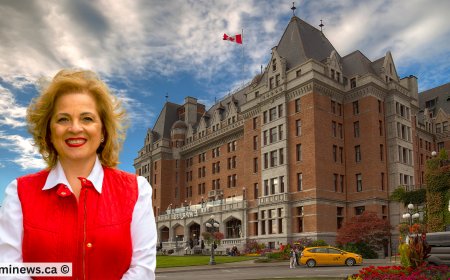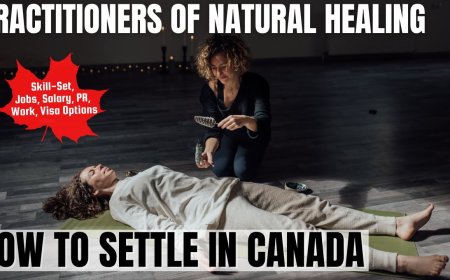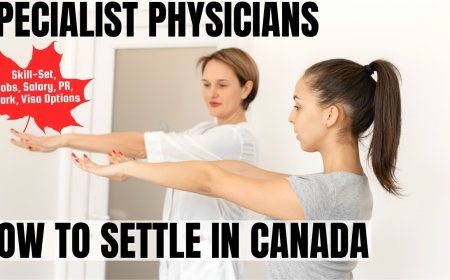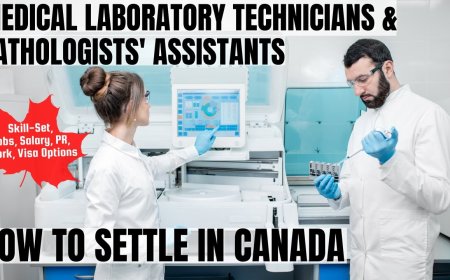Other professional occupations in therapy and assessment Guide to Canada Immigration: Exploring Salaries, Job Duties, and Where to Live
Welcome to the pathway to Canada immigration for skilled professionals and trade workers. This guide is specifically tailored for Other professional occupations in therapy and assessment looking to work and settle in Canada, offering a deep dive into the essential aspects of immigration and employment in this field.
Introduction
Canada has long been a popular destination for immigrants looking to further their careers in therapy and assessment. In this article, we will focus on the career and immigration prospects for Other professional occupations in therapy and assessment, classified under NOC 3144. We will cover the profile description, main job duties, education and licence requirements, skills needed, median and retirement ages, salary details, and possible visa options for individuals looking to pursue a career in this field in Canada. Let's dive into the opportunities that await professionals in therapy and assessment in the Great White North.
What is the Profile Description of a Other professional occupations in therapy and assessment as per the Canadian National Occupation Classification (NOC) Standards?
Other professional occupations in therapy and assessment are specialized therapists who utilize various techniques such as athletic, movement, art, or recreational therapy to assist individuals with mental and physical disabilities or injuries. These professionals work in a variety of settings including hospitals, rehabilitation centers, clinics, and educational institutions, as well as in private practice. They play a crucial role in helping individuals improve their overall well-being and quality of life through therapeutic interventions tailored to their specific needs.
What are the Main Job Duties of a Other professional occupations in therapy and assessment in Canada?
- Assess patients to determine current and potential functioning level by reviewing reports from various healthcare professionals
- Develop individualized treatment plans based on health concerns and recommendations from physicians
- Implement specialized therapy programs to maintain, rehabilitate, or enhance movement and musculoskeletal functioning
- Observe and analyze patients during treatment sessions, write progress reports, and consult with other health professionals to evaluate treatment plans
- Provide education to clients on health promotion, injury prevention, management, and treatment; may also conduct research in respective field of specialization.
What are the Education, Certifications, and Licensing Requirements to Work as Other professional occupations in therapy and assessment in Canada?
Education and certification requirements for professionals in therapy and assessment occupations vary depending on the specific role. Kinesiologists typically need a master's degree in kinesiology or human kinetics, while certification is available through the Canadian Kinesiology Alliance. Athletic therapists should have a bachelor's degree in sport therapy or health sciences with a focus on sports injury management. Art therapists need a bachelor's degree in psychology and a master's degree in art therapy, whereas music therapists require a bachelor's degree in psychology and a master's degree in music therapy. Dance therapists usually require a bachelor's degree in psychology and potentially a master's degree in art, drama, or movement therapy. Recreational therapists should hold a bachelor's degree in recreation with a specialization in therapeutic recreation. Practical training under supervision is typical in this field, along with possessing creative or technical expertise. Certification or membership with the relevant national professional association or provincial counterpart may also be necessary for these roles.
What Essential Skills are Required for Other professional occupations in therapy and assessment to succeed in Canada?
To be successful in the profession of other professional occupations in therapy and assessment, individuals must possess a variety of essential skills. These skills include the ability to interview patients and review reports from health care professionals in order to determine patients' current and potential functioning levels. Professionals in this field must also be able to prepare individualized treatment plans for each patient, implement these plans effectively, and observe and analyze patients during treatment sessions. It is also important for therapists and assessors to be able to record observations, write progress reports, and consult with other health care professionals to evaluate treatment plans. Additionally, individuals in this profession should have the ability to initiate, design, and implement specialized therapy programs, as well as conduct research in their area of specialization. Overall, successful therapists and assessors must be able to design specialized therapy programs that aim to maintain, rehabilitate, or enhance movement, musculoskeletal functioning, and performance in sports, work, and recreation.
What is the Median Age and Retirement Age for Other professional occupations in therapy and assessment in Canada?
Unfortunately, there is insufficient data available to determine the median age and average retirement age of skilled professionals working in other professional occupations in therapy and assessment. This lack of information may be due to varying retirement times based on individual circumstances and career paths within this field. It is important for organizations and institutions to gather and track this data in order to better understand the demographics and trends within this industry and to support workforce planning and development initiatives.
How many job openings exist for Other Other professional occupations in therapy and assessment in Canada, and what's their provincial distribution?
There are a total of 26 job openings in Canada for the profile of Other professional occupations in therapy and assessment. Among the provinces, Quebec has the highest number of job openings with 10 positions available, followed by Saskatchewan and Ontario with 4 openings each. British Columbia and Nova Scotia both have 3 job openings, while Alberta has 2, and New Brunswick has 1. The province with the maximum number of job openings is Quebec with 10 positions, while New Brunswick has the minimum number of job openings with only 1 position available. The demand for professionals in therapy and assessment seems to be highest in Quebec compared to other provinces in Canada.
What is the hourly wage or salary of Other professional occupations in therapy and assessment in different Provinces of Canada?
In Canada, the wages for Other professional occupations in therapy and assessment vary significantly by province. In British Columbia, the wages range from a low of $18.00 to a high of $41.00, with a median wage of $25.03. Alberta offers higher wages, with a low of $18.00, a median of $29.00, and a high of $48.20. Saskatchewan also provides competitive wages, with a low of $20.45, a median of $30.00, and a high of $40.00. Ontario, on the other hand, has a lower median wage of $23.90, with a low of $17.50 and a high of $45.00. In Quebec, wages are slightly lower, with a low of $16.00, a median of $21.00, and a high of $36.50. Overall, Alberta offers the highest wages for Other professional occupations in therapy and assessment, followed by British Columbia and Ontario.
What are the various visa options available for Other professional occupations in therapy and assessment migrating to Canada?
Other professional occupations in therapy and assessment are currently in high demand in Canada, making them eligible for Category based Express Entry Invitation draws for Canadian PR under the Healthcare Occupations Category. The Express Entry Visa Category is a popular pathway for skilled workers to immigrate to Canada based on factors such as age, education, work experience, and language proficiency. Additionally, Provincial Nominee Programs and Employer Sponsored Work Visas are also options for those in the therapy and assessment field. These programs allow individuals to apply for permanent residency or work permits with the support of a provincial government or a Canadian employer. It is worth noting that there may be other Visa options currently available for professionals in therapy and assessment. To learn more about these opportunities and discuss your individual immigration options in detail, book an appointment with our experienced professionals today.
Have Questions or Need Assistance?
If you have any queries or require assistance with your immigration plans, we're here to help. Our experienced immigration consultants are ready to provide personalized guidance tailored to your specific needs.
Don't hesitate to reach out and schedule an appointment today. Whether you're seeking clarification on immigration processes, exploring visa options, or need support with documentation, we're dedicated to assisting you every step of the way.
Book an appointment with our team to discuss your immigration goals and receive expert guidance for your journey to Canada.
What's Your Reaction?
 Like
0
Like
0
 Dislike
0
Dislike
0
 Love
0
Love
0
 Funny
0
Funny
0
 Angry
0
Angry
0
 Sad
0
Sad
0
 Wow
0
Wow
0







































































